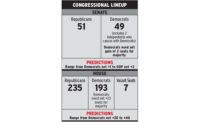As Congress heads for adjournment, the House and Senate have approved legislation aimed at tightening safety of pipelines, including new accident-notification requirements for construction firms that damage underground pipelines.
Pipeline safety was thrust into the spotlight earlier this year after one BP Alaska distribution pipeline had a 200,000-gallon spill and another had leaks and corrosion.
The Senate passed the measure Dec. 7, a day after the House approved it. The bill now goes to the White House, where President Bush is expected to sign it.
Under the new bill's construction provisions, firms doing excavation, tunneling or other underground work must use "one-call" systems, in states that have them, to locate pipelines in work areas. The measure also requires construction firms that cause pipeline damage that may be life-threatening or pose major harm to people or property to report the damage to the pipeline owner, and call the 911 emergency number if there's a release of flammable, toxic or corrosive gas or liquid.
Construction-related damage is the largest cause of pipeline accidents that cause deaths or injuries and the number of third-party incidents that lead to deaths or injuries has risen 49% since 1996, according to the Senate Commerce, Science and Transportation Committee.
The legislation extends the U.S. Dept. of Transportation's pipeline safety program for four years and broadens federal regulation authority to cover low-pressure, rural pipelines like the ones operated by BP that had failures in Alaska.
It also directs DOT to set standards for "integrity management programs" for distribution pipelines, and specifies that those standards should include installing excess flow valves for single-family homes' natural gas service lines after June 1, 2008.
Senate commerce committee Chairman Ted Stevens (R-Alaska) said the new legislation "expands on the important strides made in pipeline safety since 2002 by providing for greater oversight, research, cooperation and accountability."
House highways, transit and pipelines subcommittee Chairman Tom Petri
(R-Wisc.) says, "This bill is a good compromise and has received broad support from the administration, the states, pipeline safety advocates and others in the pipeline community."
The measure authorizes $353 million over the the fiscal 2007-2010 period, including $77 million from the Oil Spill Liability Trust Fund. The authorized funds would be subject to annual congressional appropriations.
House Approves Pipeline Safety Bill 12/7/2006
As Congress heads to adjournment, legislation aimed at tightening safety of pipelines is nearing final passage. Pipeline safety was thrust into the spotlight earlier this year after one BP Alaska distribution pipeline had a 200,000-gallon spill and another had leaks and corrosion.
The House on Dec. 6 approved a measure extending the U.S. Dept. of Transportation's pipeline safety program for four years, and also broadens federal regulation to cover low-pressure, rural pipelines like the ones operated by BP that had failures in Alaska.
It also directs DOT to set standards for "integrity management programs" for distribution pipelines, and specifies that those standards should include installing excess flow valves
House highways, transit and pipelines subcommittee Chairman Tom Petri
(R-Wis.) says, "This bill is a good compromise and has received broad support from the administration, the states, pipeline safety advocates and others in the pipeline community."
The measure authorizes $353 million over the the fiscal 2007-2010 period, including $77 million from the Oil Spill Liability Trust Fund. The authorized funds would be subject to annual congressional appropriations.
The next step for the bill would be action by the Senate. The House Transportation and Infrastructure Committee says the measure that cleared the House is the product of an agreement with the Senate commerce committee.



